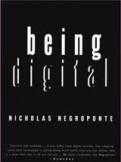In the information and entertainment industries, bits and atoms often are confused. Is the publisher of a book in the information delivery business (bits) or in the manufacturing business (atoms)? The historical answer is both, but that will change rapidly as information appliances become more ubiquitous and user-friendly. Right now it is hard, but not impossible, to compete with the qualities of a printed book.
In 1995, Nicholas Negroponte, founder of the MIT Media Lab, published “Being Digital,” a manifesto of musings and predictions for the digital age. His main thesis is information moving from the realm of atoms (physical matter) to that of bits (the digital ether) has profound implications on how people work and play.
“User in control” is a consistent thread throughout Negroponte’s book.
Two small sections in the book are particularly insightful: “Place Without Space” and “Being Home and Abroad at the Same Time.” They describe separating physical location from identity. Location independence comes from the power to access the network from anywhere. Once you have access to the network, you have access to communications, media, applications, family, friends, colleagues, and customers. Enter Wi-Fi (define), and access is further separated from wires, making it possible to “jack in” just by being in the proximity of a hotspot.
Most of his predictions have come good in over a decade’s time. It’s a good time to revisit ‘Being Digital’ and explore the possibility ‘being virtual’ in our lives and business.
Related Links
OBS
Nicholas

